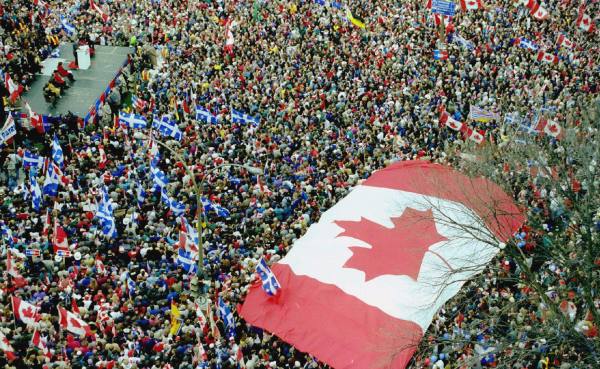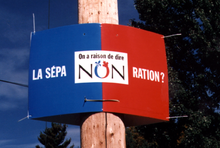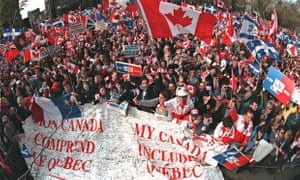
We travelled up Highway 401 eastbound that fall morning – from Uxbridge to Montreal – to make a statement to friends and strangers alike on the other side of the Ottawa River. We felt threatened by voices of separation in la belle province, but heartened by the “No” forces – both francophone and anglophone – that wanted Quebecers to give Canada one more chance. And that autumn day we car-pooled, bussed, hitchhiked, and rallied – some 100,000 of us – at Place du Canada in Montreal.
I remember one of our daughters who couldn’t travel with us to the pro-Canada rally that Oct. 27 morning, left a note on the bathroom mirror.
“I’m sorry I can’t go with you,” she wrote. “Please save my country.”
 Well, as it turned out, we did. But just by the skin of our teeth. The “No” (or stay-in-Canada) side won the Oct. 30, 1995, referendum with a 50.58 percent majority. But we felt we had won in the name of a reborn nationalism. I can remember only a few times in my life when I’ve felt as true a sense of nationhood as strongly. The summer of 1967 when we all celebrated the Centennial of Confederation at Expo 67, was one. Bringing the Olympics to Montreal in 1976, was another. And when the federal government introduced the Crown Corporation, Petro-Canada, to supply Canadians with domestically produced oil and gas beginning in 1976, was another. I remember those times feeling a healthy kind of nationalism.
Well, as it turned out, we did. But just by the skin of our teeth. The “No” (or stay-in-Canada) side won the Oct. 30, 1995, referendum with a 50.58 percent majority. But we felt we had won in the name of a reborn nationalism. I can remember only a few times in my life when I’ve felt as true a sense of nationhood as strongly. The summer of 1967 when we all celebrated the Centennial of Confederation at Expo 67, was one. Bringing the Olympics to Montreal in 1976, was another. And when the federal government introduced the Crown Corporation, Petro-Canada, to supply Canadians with domestically produced oil and gas beginning in 1976, was another. I remember those times feeling a healthy kind of nationalism.
But all that has changed. My old-fashioned nationalism has taken a real beating lately, particularly since Brexit, the rebirth of isolationist thinking across Europe, and the during the first two years of rule by a so-called “nationalist” president in the United States. Suddenly, a newfound nationalism that professes exclusion, or self-interest over common good, and national pride at the expense of anybody who doesn’t speak the same language, follow the same religion, or have the same racial origin has corrupted my national pride of country, from a generation ago.

Donald Trump’s nationalism is more like ethnic nationalism, a kind of America uber alles. His brand of nationalism has changed a love of country into a distrust of anybody the President doesn’t happen to like on any given day – be they immigrants, free-traders or UN ambassadors.
A few weeks ago, when the leaders of the former Western Allies in the Great War gathered for the centennial of the Nov. 11 Armistice in Europe, some warned that this new nationalism was posing a grave threat to peace and security. “Old demons are rising again,” French President Emmanuel Macron said. “By putting our own interests first, with no regard for others, we erase the very thing that a nation holds dearest.”
I always thought nationalism, at its best, suggested something valuable, something that people living in a common space felt as a unifying force. I never considered the nationalism as exclusionary, discriminatory or superior. To me expressing pride in Canada meant a widening of boundaries to include anyone and everyone, a way of making all who lived or came to live in Canada better, happier, productive and more compatible.
To me that kind of pride is more like “civic nationalism,” a way of achieving higher ideals, focused on what makes us better as a country, not at the expense of any other nation. And if, in the course of that pursuit, our national government also looked outward to international trade agreements, military alliances, and collaboration on such issues as immigration and climate change, so much the better.
Andrew Coyne, in the National Post a few weeks ago, reminded readers that “the Fathers of Confederation were explicit in their desire to create a common ‘political nationality’ that would transcend our ethnic and religious divisions.” It’s likely they were hoping, no matter what a Canadian citizen’s origin, that she or he could abide by the tenets of a North American parliamentary democracy while acknowledging the faiths and cultural habits of the old countries from which they came.
The kind of nationalism that people such as Donald Trump and Steve Bannon espouse tends to serve only the individuals of a particular persuasion. In a way, it’s kind of “arbitrary nationalism,” beneficial for those inside its walls, not so beneficial for those outside them.

“Canadian nationalism,” wrote Myrna Kostash, an author whose sense of Canada I’ve always admired, “is a passionate attachment to a cumulative achievement or experience, that hasn’t got anything to do with denigrating or fearing or hating other cultures.”
Myrna wrote those words in the early 1990s, when the threat of Quebec separation seemed a very real possibility. Suddenly, our sense of nationalism was severely tested. And we reached out to Quebec. Myrna felt, as I did, during the lead-up to the 1995 referendum, “Just knowing that something precious would be lost to the human gene-pool if Canada fell apart, keeps me loyal.”
Hey, arbitrary nationalists, read our lips!